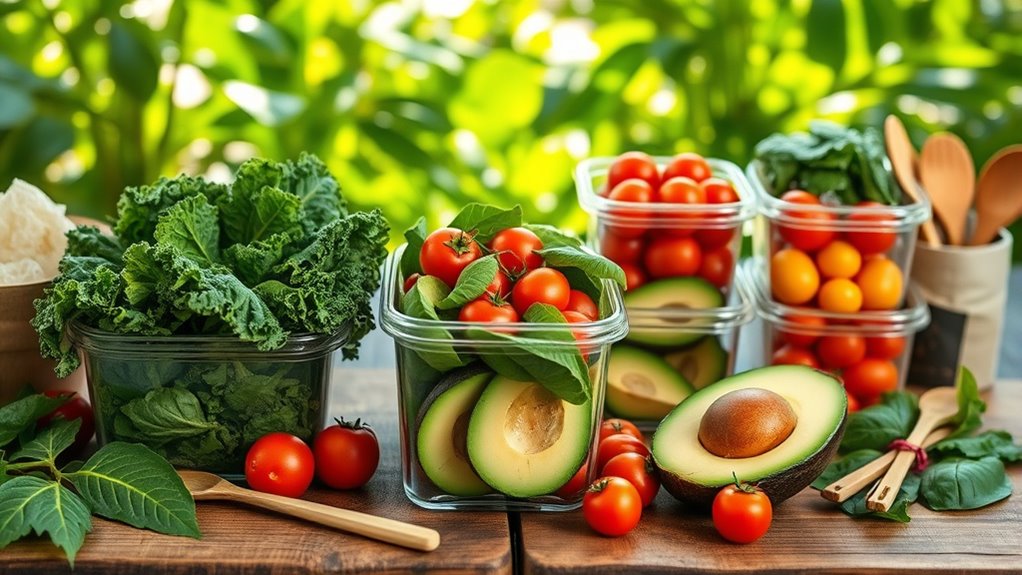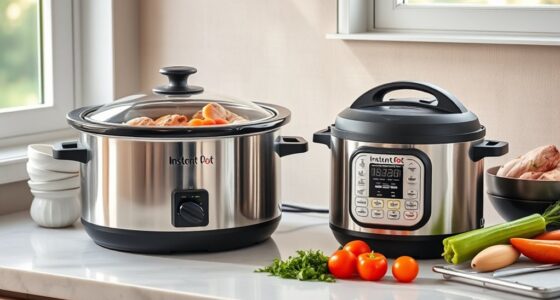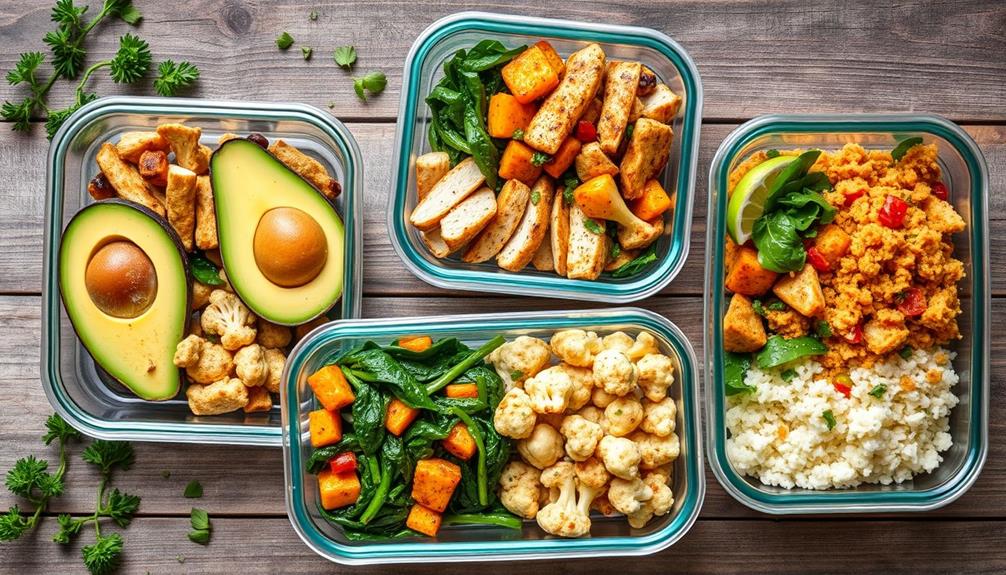Adopting eco-friendly meal prep habits helps you cut down on waste and lessen your environmental impact. Swap disposable containers for reusable ones made of glass or BPA-free plastic, and wash them regularly to keep food fresh. Compost food scraps like vegetable peels and coffee grounds to reduce landfill waste and produce valuable soil. Small changes like these can substantially lower plastic pollution and greenhouse gases—keep going to discover more simple ways to make your meals greener.
Key Takeaways
- Use reusable containers of various sizes to store meals and leftovers, reducing single-use packaging waste.
- Incorporate composting for food scraps like vegetable peels and coffee grounds to minimize landfill contributions.
- Choose durable, eco-friendly materials like glass or BPA-free plastic for long-lasting meal storage.
- Practice mindful portioning and waste reduction to prevent unnecessary food disposal.
- Support sustainable practices by combining meal prep with composting and reusable containers for a greener lifestyle.

Have you ever wondered how your meal prep habits impact the environment? Small changes can make a big difference, especially when it comes to reducing waste. One of the easiest ways to do this is by switching to reusable containers. Instead of using single-use plastic bags or foil, investing in durable, high-quality containers allows you to store your meals without creating unnecessary trash. Reusable containers come in various sizes and materials, such as glass or BPA-free plastic, making them versatile for different types of food. Not only do they cut down on waste, but they also help keep your food fresh longer and eliminate the need for disposable packaging. Incorporating these containers into your routine is simple and convenient; just wash and reuse them daily. Over time, you’ll notice a significant reduction in your plastic waste, and you’ll be doing your part to lessen environmental pollution.
Another essential aspect of eco-friendly meal prep involves composting tips. Food scraps like vegetable peels, coffee grounds, and fruit cores often end up in the trash, where they contribute to landfill overflow and methane emissions. Composting transforms these organic materials into nutrient-rich soil that benefits your garden or plants. To start, designate a compost bin in your kitchen, preferably one with a lid to contain odors. Regularly collect compostable scraps and balance them with browns like dry leaves or shredded paper to maintain an efficient compost pile. Turning the compost periodically speeds up decomposition, ensuring you get usable compost faster. Composting not only reduces landfill waste but also minimizes greenhouse gases associated with organic waste breakdown. Plus, it’s a sustainable practice that reconnects you with nature and promotes healthier soils.
Adopting these practices goes beyond just reducing waste; it encourages a more mindful approach to your daily habits. When you use reusable containers, you’re actively decreasing reliance on disposable plastics, which often end up polluting oceans and harming wildlife. Meanwhile, composting tips help you close the loop in your food cycle, turning scraps into a valuable resource rather than trash. Both approaches foster a sense of responsibility and awareness about your environmental footprint. As you incorporate these habits into your meal prep routine, you’ll find it easier to stay committed, knowing you’re making a positive impact. Small steps like these not only conserve resources but also inspire others around you to adopt more sustainable habits. In the end, eco-friendly meal prep isn’t just about saving the planet — it’s about creating a healthier, more sustainable lifestyle for yourself and future generations.
Frequently Asked Questions
How Can I Minimize Packaging Waste When Shopping for Meal Prep Ingredients?
To minimize packaging waste when shopping for meal prep ingredients, you should bring reusable bags to cut down on single-use plastics. Opt for bulk buying whenever possible, as it reduces packaging and lets you purchase only what you need. Also, choose loose produce or items in minimal packaging. These simple steps help you cut waste, save money, and support sustainability efforts.
What Are Some Eco-Friendly Storage Options for Prepped Meals?
To keep your prepped meals fresh, you should consider eco-friendly storage options like reusable containers, which are durable and help cut down waste. Beeswax wraps are also a great alternative for covering bowls or wrapping sandwiches, as they’re natural and reusable. By choosing these sustainable options, you not only reduce plastic waste but also promote environmentally-conscious habits in your meal prep routine.
How Do I Compost Food Scraps From Meal Prep Efficiently?
Imagine turning food waste into nutrient-rich compost instead of trash. To compost efficiently, you need a good composting bin—choose one with airflow to prevent odor. Collect your food scraps, like vegetable peels and coffee grounds, and add them to your bin, balancing browns and greens. Regularly turn the compost to speed up decomposition. Soon, you’ll have natural fertilizer, reducing waste and supporting a greener environment.
What Sustainable Sources Should I Consider for Organic Ingredients?
When choosing organic ingredients, consider sourcing from local farms and organic markets. These options guarantee you’re getting fresh, sustainably grown produce that supports your community and reduces transportation emissions. Local farms often practice eco-friendly farming methods, while organic markets provide a variety of certified organic products. By opting for these sources, you’ll boost your eco-conscious meal prep and enjoy healthier, more sustainable ingredients.
How Can I Reduce Energy Consumption During Meal Preparation?
Think of your kitchen as a well-oiled machine where every move counts. To cut energy use, you should use energy-efficient appliances and plan your meal prep timing wisely. Batch cooking saves power by reducing stove or oven use. Also, defrost frozen ingredients in the fridge overnight instead of using the microwave. These small adjustments help your kitchen run smoothly while lowering energy consumption.
Conclusion
By embracing eco-friendly meal prep, you can cut costs, curb waste, and cultivate a cleaner, greener planet. Commit to conscious choices, composting, and creative cooking to make a meaningful impact. Small steps in sustainability can spark significant change, so start today and stay dedicated. Remember, every effort counts—because when you choose to care, you create a cycle of positive change that benefits both your body and the Earth.









